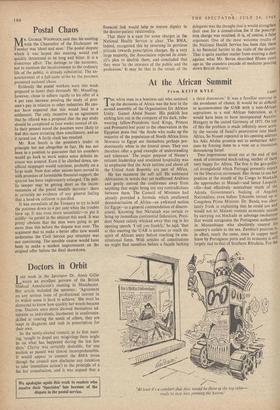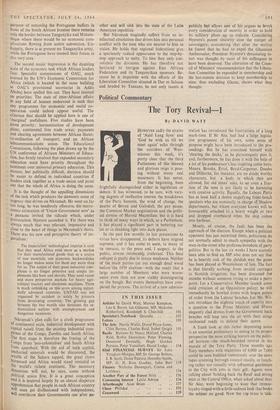At the African Summit
from KEITH KYLE He has mastered the soft sell. He embraced Africanism in words that yet reaffirmed Arabism and gently steered the conference away from anything that might bring out any contradictions between them. The Council of Ministers had already provided a formula which swallowed denuclearisation of Africa—an awkward notion for Egypt—in a general commendation of disarm- ament. Knowing that Nkrumah was certain to bring up immediate continental federation, Presi- dent Nasser calmly whisked away that rug in his opening speech. 'I tell you frankly,' he said, 'that at this meeting the UAR is anxious to reach the spirit of African unity before reaching its con- stitutional form. With articles of constitutions we might find ourselves before a facade lacking
a third dimension.' It was a familiar exercise in the avoidance of choice. It would be as difficult to accommodate the UAR with it non-African aspirations in a real African federation, as it would have been to have incorporated Austria- Hungary in the united Germany of 1871. On top of this the problem is made infinitely more acute by the success of Israel's penetration into black Africa. So Nasser repeated in his opening address his Adis Ababa promise not to embarrass Afri- cans by forcing them to a vote on a resolution denouncing Israel.
Two impressions stand out at the end of this week of continental stock-taking, neither of them very happy for Africa. The first is the geopoliti- cal stranglehold which Portugal presently enjoys on the liberation movement. Her threat to use her position at the mouth of the Congo to blockade the approaches to Matadi—and hence Leopold' ville—had effectively neutralised much of the Adoula Government's backing of Angolan Nationalists, even before Tshombe turned up as Congolese Prime Minister. Dr. Banda_ was abso- lutely frank in explaining that he could not and would not let Malawi commit economic suicide by carrying out blockade or sabotage resolutions that would antagonise the Portuguese authorities in Mozambique who absolutely control I is country's outlets to the sea. Zambia's position is, in effect, much the same, since its copper must leave by Portuguese ports and its economy is still largely tied to that of Southern Rhodesia. For the 'At least it's a comfort that Alec would be there at the top table—
ready to stop him pressing the button.'
purpose of removing the Portuguese buffers in front of the South African frontier there remains only the border between Tanganyika and Mozam- bique where there would be no economic corn- plications flowing from active subversion. Un- happily, there is at present no Tanganyika army, while the Portuguese have massed their forces in this very area.
The second major impression is the daunting scale of the economic task which African leaders face. Specialist commissions of OAU, much assisted by the UN's Economic Commission for Africa (which is located in the same building as OAU's provisional secretariat in Addis Ababa) have spelled this out. They have insisted on priorities. The state of inter-African affairs in any field of human endeavour is such that any programme for economic and social co- operation could indeed appear useful. The criterion that should be applied here is one of `marginal' usefulness. Five studies have been given priority: harmonisation of development Plans; continental free trade areas; payments and clearing agreements between African States; co-ordination of transport; and an African telecommunications union. The Educational Commission, following the plan drawn up by the UN conference of African Ministers of Educa- tion, has firmly resolved that expanded secondary education must have priority throughout the continent over universal primary education. This mature, but politically difficult, decision should be easier to defend in individual countries if leaders stick together as a trade union and point out that the whole of Africa is doing the same.
It is the thought of the appalling dimensions of the task which produces the dmmonic sense of urgency that drives on Nkrumah. He went on, far too long, he was needlessly offensive, his metro- nomic reiteration of 'Union Government now' as a panacea invited the ridicule which, under provocation, Nyerere accorded it. Yet there was always much that was relevant, impressive and Close to the heart of things in Nkrumah's thesis. There was his new and perceptive theory of im- perialism :
The Imperialists' technological impetus is such that they need Africa even more as a market for their manufactured goods than as a source of raw materials; our economic backwardness no longer makes sense for them any more than for us. The output of their great industrial com- plexes is no longer primitive and simple im- plements like hoes and shovels. They need vaster and more prosperous markets for heavy agri- cultural tractors and electronic machines. There is much rethinking on this score among indust- rially advanced countries. UNTAD was not organised by accident or solely by pressure from developing countries. The growing gap between the two worlds also threatens the in- dustrialised nations with unemployment and ,dangerous recessions.
Nkrumah's plan calls for a crash programme of continental scale, industrial development with capital raised from the existing industrial com- plexes of the Congo, Zambia and South Africa. The first stage is therefore the freeing of the Congo from 'neo-colonialism' and South Africa from apartheid. With the aid of such capital, uncharted minerals would be discovered, the -Wealth of the Sahara tapped, the great rivers harnessed and Africa would stand revealed as the world's richest continent. The necessary dYnamistn will not, he says, come without Political union first. It is a great conception and it is inspired largely by an almost desperate apprehension that people in each African country Will soon get disillusioned with independence, Will overthrow their Governments one after an-
other and will sink into the state of the Latin American republics.
But Nkrumah tragically suffers from an in- tellectual absolutism that drives him into personal conflict with the men who are nearest to him in vision. He holds that regional federations give a spuriously radical appearance to the step-by- step approach to unity. To him they only con- solidate the divisions. He has therefore not hesitated to intrigue against East African Federation and its Tanganyikan sponsors. Be- cause he is impatient with the efforts of the Liberation Committee situated in Dar es Salaam and headed by Tanzans, he not only taunts it publicly but allows one of his organs to break every consideration of security in order to hold its military plans up to ridicule. Considering Nyerere's patent sincerity over the merger of sovereignty, considering that after the mutiny he found that he had to expel the Ghanaian Ambassador, President Nyerere's devastating re- tort was thought by most of his colleagues to have been deserved. The alteration of the Coun- cil of Ministers' recommendation that the Libera- tion Committee be expanded in membership and the last-minute decision to keep membership to nine, thus excluding Ghana, shows what they thought.















































 Previous page
Previous page